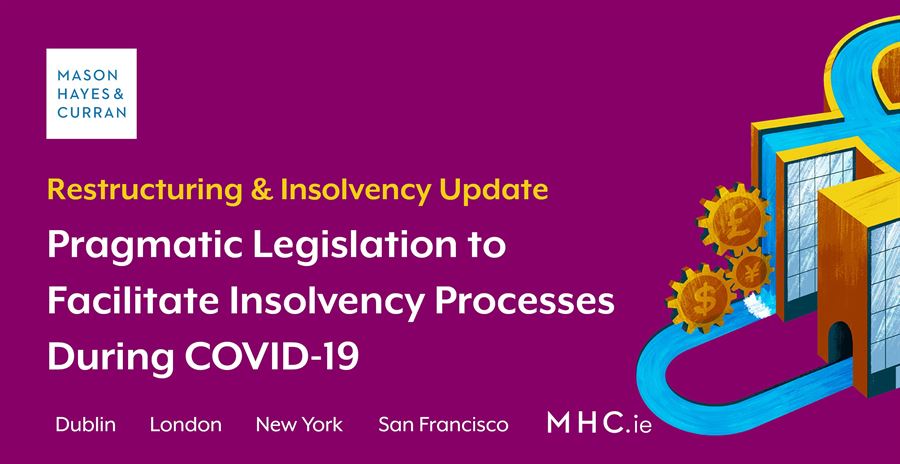
Late in the evening on 30 July, the last day before its summer break, the Irish parliament (Oireachtas) passed the Companies (Miscellaneous Provisions) (Covid-19) Bill 2020. This is likely to be signed into law and commenced within two weeks.
Three of its provisions are particularly relevant to insolvency processes during the COVID-19 crisis.
Creditors’ meetings
![]() Companies will be explicitly enabled to convene and hold creditors’ meetings to commence a winding up and during a winding up partly or wholly by virtual means. There are no specific technology requirements and platforms such as Zoom, WebEx or Microsoft Teams appear suitable although specific technology to facilitate taking polls would be useful.
Companies will be explicitly enabled to convene and hold creditors’ meetings to commence a winding up and during a winding up partly or wholly by virtual means. There are no specific technology requirements and platforms such as Zoom, WebEx or Microsoft Teams appear suitable although specific technology to facilitate taking polls would be useful.
The key requirements for such meetings are:
-
the technology must enable real time transmission and real time two-way audio-visual or audio communication enabling relevant attendees as a whole with a reasonable opportunity to participate in the meeting
-
the person holding the meeting must ensure so far as practicable that certain data security and integrity measures are put in place
-
notices of the meeting will have to include certain information about the technology to be used and any processes to verify identity of attendances
-
participants must be enabled to hear what is said and speak and submit comments during the meeting
Creditors’ winding up petitions
In recognition of the cash flow difficulties being faced by certain companies, the amount claimed by a creditor to ground a winding up petition is to be increased to €50,000 (from the current levels of €10,000 for a single creditor and €20,000 for creditors acting together).
Potential extension of examinership
In light of the practical difficulties to put rescue finance in place for companies in examinership, the High Court is to be given power to extend an examinership by up to 50 days beyond the current 100 day limit.
What is not in the Bill - Directors’ liability
Proposals advanced by certain organisations for relief for directors from the risk of restriction or imposition of personal liability for reckless trading during the pandemic are not reflected in the Bill.
This is likely due to the statement issued on 4 June 2020 by the Office of the Director of Corporate (ODCE), titled “Enforcement Covid-19 and the insolvency-related functions of the ODCE”, about which we have written previously, which would appear to provide adequate reassurance that directors will not suffer sanctions without just cause.
Duration of proposed temporary measures
The Bill provides that the temporary measures envisaged will apply until 31 December with a possibility of extension (but no later than 30 June 2021). This mirrors the possibility of an extension of the other emergency Covid-19-related legislation passed earlier in the year.
Comment
Lockdown and the social distancing measures presented immediate problems for creditors’ meetings. While it was clear that there was no legislative basis to hold such meetings remotely, with no definite end in sight, practical views were taken by many insolvency practitioners and numerous creditors’ meetings have taken place remotely since March.
Therefore, the official endorsement of remote creditors’ meetings is to be welcomed as it removes the attendant risk of a challenge to any business transacted at future meetings.
Raising the threshold for winding up petitions is also welcome but may in fact be of limited effect. It would be rare to see a creditor petitioning to wind up a company for a debt of less than €50,000.
Extending the maximum period of examinerships may have the biggest impact. This is because investment is more likely to become available to businesses in examinership as more clarity emerges as to the likely resumption of normal commerce as the COVID-19 crisis hopefully draws to a close.
The content of this article is provided for information purposes only and does not constitute legal or other advice.




